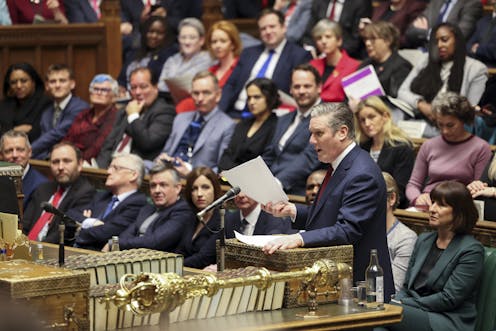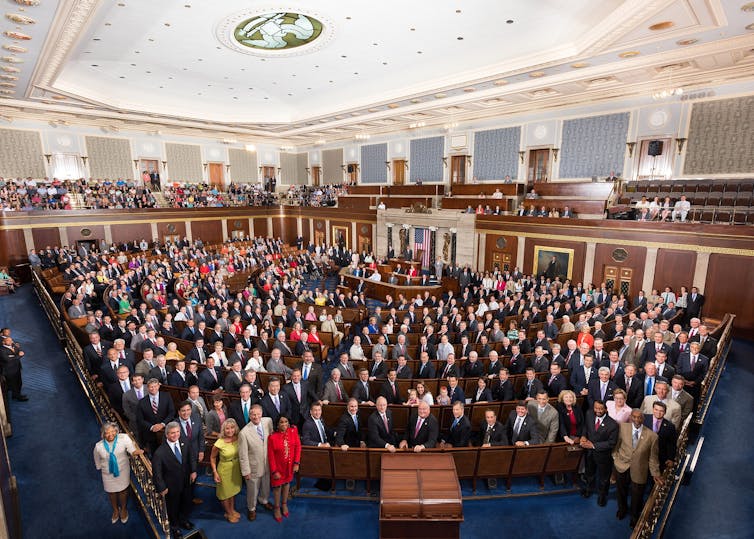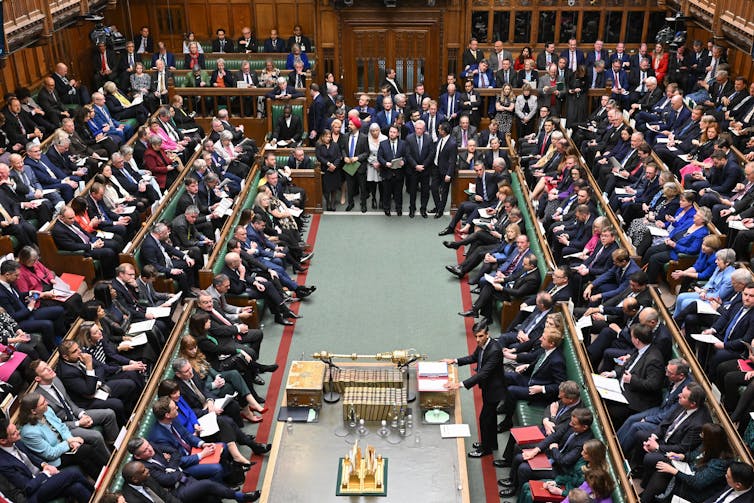
In a somewhat unusual tactic for a governing party seeking re-election, senior Conservative figures have all but conceded defeat two weeks before polling day. Instead of campaigning on their plans for another term in government, cabinet ministers, from the prime minister down, have taken to warning of the dangers of voters giving Labour a “supermajority” in the House of Commons.
Leaving aside whether this outbreak of candour is effective electoral politics, is there any merit in the argument being made? The term “supermajority” was first used by the defence secretary Grant Shapps, and has now become ubiquitous in commentary since. This has annoyed many political academics and others, who rightly point out that there is no such thing as a supermajority in relation to a UK general election.
A “supermajority”, in its true sense, applies to voting systems in which a higher threshold than a simple majority has been set for certain provisions. Passing that threshold thus unlocks additional powers.
Want more election coverage from The Conversation’s academic experts? Over the coming weeks, we’ll bring you informed analysis of developments in the campaign and we’ll fact check the claims being made.
Sign up for our new, weekly election newsletter, delivered every Friday throughout the campaign and beyond.
In the United States there are numerous examples. Having a two-thirds majority in both houses of Congress, for example, earns a party the right to override a presidential veto and to propose constitutional amendments. Winning a supermajority in the Senate in particular unlocks significant extra powers for the party that achieves it.

No such provisions apply to the House of Commons in the UK so the term is inaccurate and meaningless in the British context. While it is true that the now defunct Fixed-term Parliaments Act did set a “supermajority” threshold for triggering an early election, that act could always have been circumvented by a government passing a specific new law to trigger an early election (as happened 2019), or repealing the act completely (as happened in 2022). Both these actions required only a simple majority of MPs.
This example seems to give the lie to any notion of a British “supermajority”. The principle of parliamentary sovereignty makes a nonsense of any such provisions, which are ultimately unenforceable. So, no, Labour is not heading for a “supermajority”. Conservatives should stop trolling political scientists by using the term – and misleading the public in the process.
It is more accurate to say that Labour currently looks to be heading for a landslide. Polls project the party winning more than 400 seats to achieve a majority in the hundreds of seats. One particularly eye-watering poll shows Labour on more than 500 seats, with a majority of 382 and the Conservatives down to a rump of just 53 seats, a mere whisker ahead of the Liberal Democrats on 50.
While it seems hard to believe, such a result is not outside the realms of possibility. But, crucially, in parliamentary terms, there is no difference between a government with a small working majority and one with a massive one.
As long as a government can reliably get its MPs to troop through the lobbies to back its legislation, a governing party with 370 seats is just as powerful as one with 500. In neither case can the opposition normally hope to win a vote.

The reality of a large majority
But beyond the simple arithmetic, there are nevertheless serious consequences to the government enjoying such a vast majority over its opponents. The first, which might sound trivial, is the matter of seating. The design of the House of Commons chamber, with its benches facing one another, assumes a two-party system in which government and opposition are broadly balanced. It isn’t set up for extremely lopsided results.
In 1940, when the Labour party entered the wartime coalition, their backbench MPs remained sitting on the opposition benches simply because there wasn’t room for them on the government side. One-party dominance might again have to be reflected in the government literally taking seats from the opposition.
This would be an effective visual representation of other procedural disadvantages that would be suffered by those opposing an unusually dominant governing party. Seats on select committees (and their chairs) are allocated in proportion to party strength in the house, so a reduced opposition would have very few seats on these important scrutiny bodies.
Then there are resources. Opposition parties receive state funding for their work holding the government to account, which is used to pay for essential research staff. The amount they receive is directly related to vote share and seats won, so a smaller opposition gets much less money. This would inevitably affect their ability properly to scrutinise the government.
If the Conservatives are reduced to tens of seats, they would also be unable to appoint a full shadow government, with their MPs having to cover a number of portfolios, as the smaller parties do. Much more work would be likely to fall on Conservative peers in the House of Lords, where the party would (at least initially) enjoy a numerical advantage over Labour.
‘No, we’re the opposition!’
We could also expect arguments to break out if the Conservatives and Lib Dems do indeed find themselves within a few seats of one another in the House of Commons. The official opposition is afforded a number of privileges and benefits not given to the other parties, the most tangible of which is some £1 million a year in additional funding for running the leader of the opposition’s office.
The title of “leader of his majesty’s opposition” also brings with it enhanced national status, an additional salary and other perks, including an official car. For one party to receive all this when its numerical advantage is so marginal is likely to prompt heated arguments about unfairness. Similar arguments broke out in 1918 between Labour and the remnant’s of Asquith’s Liberal party.
Meanwhile, the government would be getting an easy ride. Not only would the main opposition party struggle to fulfil its day-to-day role of holding the government to account, but it would also struggle to present itself as a credible government-in-waiting.
A result on the scale some polls are suggesting would raise serious questions about the future status of the Conservative party as a main contender for power. While they will hope to emulate the Labour party, which collapsed to 52 seats in 1931 before returning to government with a landslide in the next decade, such a recovery is by no means inevitable.
A century ago, the Liberal party was displaced by Labour as the main party of opposition, fundamentally changing the political landscape on which elections have been fought ever since. The significance of what is about to happen on July 4 is not so much the size of Labour’s likely majority, but whether we are about to see a similarly historic realignment on the opposition benches.
Nigel Fletcher is the co-founder of the Centre for Opposition Studies, a not-for-profit research group. He was previously a Conservative councillor and an adviser to the Shadow Cabinet before the 2010 election.
This article was originally published on The Conversation. Read the original article.







